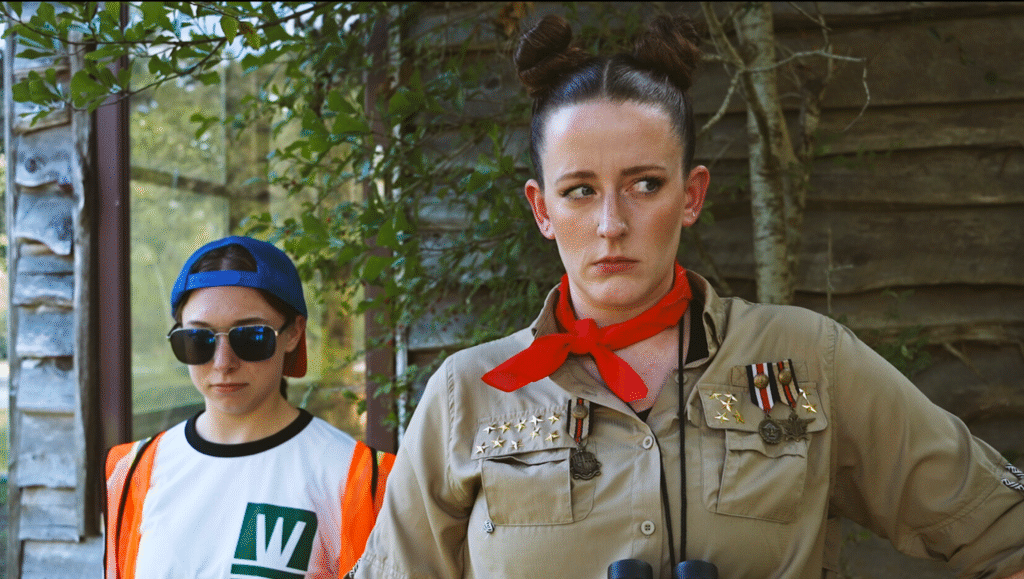Related: Every Time Taylor Swift Attended Travis Kelce’s NFL Games in 2023
Advertisement
Al Bello/Getty Images
Taylor Swift was named MVP, “most valuable princess,” during the Kansas City Chiefs game on Sunday, January 21.
“Look who’s in the house, that’s Taylor Swift, the MVP — most valuable princess — of Chiefs Kingdom,” one of the CBS announcers said as the camera showed Swift, 34, in the Kelce family suite chatting with boyfriend Travis Kelce‘s sister-in-law, Kylie Kelce.
“There’s always a little luck involved in football,” the commentator added. “Hopefully, she’s a good luck charm for Kelce and the crew.”
Later in the game, the cameras cut to Swift again, prompting Tony Romo to say, “There’s an interested fan right there.”
Taylor Swift has arrived in Buffalo pic.twitter.com/LJk9YeZLxy
— NFL on CBS (@NFLonCBS) January 21, 2024
To be fair, that’s more accurate than what he has previously called Swift. The former Dallas Cowboys quarterback, 43, referred to Swift as Kelce’s wife during two separate games last year.
During the Christmas Day game, Romo was discussing Kelce’s 900th career reception when he noticed the camera landed on Swift, who was ringing a bell to celebrate in Kelce’s suite at Arrowhead Stadium. “And his wife loves it — I mean girlfriend,” Romo said, quickly correcting himself.
Al Bello/Getty Images
Romo’s colleague Jim Nantz chuckled and said, “You’ve been down that road with that before.”
When Swift attended the December 10 game against the Buffalo Bills, Romo made the exact same blunder. “As you see, Kelce’s wife, Taylor Swift, in the audience,” he told viewers. Romo quickly laughed off his mistake, adding, “I’m sorry, girlfriend.”
“Not yet,” Nantz, 64, added. A few moments later, Nantz joked, “You don’t know something we don’t know, do you?”
Sunday’s game was big one for the Kansas City Chiefs as they took on the Buffalo Bills to determine which team would go to the AFC Championship. In addition to Kelce’s girlfriend, he had the support of his entire immediate family. Mom Donna Kelce, dad Ed Kelce, brother Jason Kelce and his sister-in-law Kylie, 31, were all at Highmark Stadium in upstate New York to cheer on the tight end.
It could be the end of Travis’ season if they lose, but either way, it is one of the last games Swift can attend this season before kicking off the next international leg of her Eras Tour. Even if the Chiefs go to the Super Bowl, Swift will be unable to attend since she has a concert in Japan.
Amid their busy schedules, the couple prioritize their relationship, which started over last summer. “Taylor and Travis make a concerted effort to keep their connection alive and thriving,” a source exclusively revealed in the latest issue of Us Weekly, adding that Swift “calling a lot of the shots” in their romance.
Al Bello/Getty Images Taylor Swift was named MVP, “most valuable princess,” during the Kansas City Chiefs game on Sunday, January 21. “Look who’s in the house, that’s Taylor Swift, the MVP — most valuable princess — of Chiefs Kingdom,” one of the CBS announcers said as the camera showed Swift, 34, in the Kelce family
Us Weekly Read More

By all appearances, Hollywood is a dream factory — a place where charisma, talent, and luck collide to create stars. But behind the camera lights and red carpets lies a conversation few inside the industry speak openly about: the spiritual and moral price of ambition.

For actor Omar Gooding, the idea of “selling your soul” in Hollywood isn’t a metaphor — it’s a moral process that begins with tiny compromises. In an October 2025 interview, Gooding explained that no one in Hollywood makes a literal deal with the devil. Instead, it’s the quiet yeses, the moments when comfort overrides conviction, that mark the beginning of the trade. “They don’t say, ‘Take this or you’ll never make it,’” he said. “They just put it in front of you. You choose.”
Those choices, he argues, create a pattern. Once you show that you’ll accept something you once resisted, the industry notices. “Hollywood knows who it can get away with what,” Gooding said. “One thing always leads to another.” The phrase “selling your soul,” in this context, means losing your say — doing what you’re told rather than what you believe in.
That moral tension has long shadowed the arts. Comedians like Dave Chappelle, who famously walked away from millions to preserve his creative integrity, often serve as examples of where conviction and career collide. In resurfaced interviews, Chappelle hinted that he felt manipulated and silenced by powerful figures who sought control of his narrative, warning that “they’re trying to convince me I’m insane.”
This isn’t just about conspiracy — it’s about agency. Hollywood runs on perception. Performers are rewarded for being agreeable, moldable, entertaining. Those who question the machine or refuse the script risk exile, while those who conform are elevated — sometimes beyond what they can handle.
“We see the ‘collections’ all the time,” Gooding explained. “When the bill comes due, you can tell. They made that deal long ago.”

But the story doesn’t end in darkness. Gooding also emphasizes that in today’s entertainment landscape, artists have more control than ever. With streaming, social media, and creator‑driven platforms, performers don’t have to “play the game” to be seen. Independent creators can build their own stages, speak their own truths, and reach millions without trading authenticity for access.
Still, the temptation remains — recognition, validation, quick success. And every generation of artists must answer the same question: What are you willing to do for fame?
As Gooding put it, “You just make the best choices you can. Because once it’s gone — your name, your peace, your soul — there’s no buying it back.”

California just made a dramatic stand for human creativity, defeating the threat of AI actor clones with a sweeping new law that puts people—not algorithms—back in the Hollywood spotlight. With the stroke of Governor Gavin Newsom’s pen in October 2025, the state has sent a clear message to studios, tech companies, and the world: entertainment’s heart belongs to those who create and perform, not to digital facsimiles.
For months, the entertainment industry has been divided over the use of artificial intelligence in filmmaking. Studios, lured by promises of cost-cutting and creative flexibility, have invested in software that can mimic an actor’s face, voice, and even emotional range. But for performers, this wave of synthetic reproduction has triggered alarm—encouraged by chilling stories of deepfakes, unauthorized digital doubles, and contracts that let studios reuse a star’s likeness indefinitely, sometimes without pay or approval.
The new California law, anchored by AB 2602 and AB 1836, changes everything:
The legislation rides the momentum of the recent SAG-AFTRA strike, where real-life talent demanded control over their own digital destinies. Leaders say these protections will empower artists to negotiate fair contracts and refuse participation in projects that cross ethical lines, restoring dignity and choice in an industry threatened by silent algorithms.
Stars, unions, and advocacy groups are hailing the law as the most robust defense yet against unwanted AI replications.
As one actor put it, “This isn’t just about money—it’s about identity, legacy, and respect for real artists in a synthetic age.”
California’s move isn’t just a victory for local talent—it’s a warning shot to studios everywhere. Companies will now be forced to rethink production pipelines, consult legal counsel, and obtain proper clearance before digitally cloning anyone. Global entertainment platforms and tech developers will need to comply if they want to do business in the world’s entertainment capital.

These laws also set a template likely to ripple through other creative fields, from musicians whose voices can be synthesized to writers whose work could be mimicked by generative AI. For now, California performers finally have a powerful shield, ready to fight for the right to shape their own public image.
With its no-nonsense ban on AI actor clones, California draws a bold line, championing the work, likeness, and very humanity of its creative stars. It’s a landmark step that forces the entertainment industry to choose: respect real talent, or face real consequences. The age of the consentless digital double is over—human performers remain the true source of Hollywood magic.

Darby Kingman’s “Camp Wackapoo: Rise of Glog” redefines summer camp comedy with a wild, energetic story about ambition, chaos, and the joy of embracing the unexpected. The film centers on a relentlessly competitive camp counselor who’s determined to finish first—only to face a motley crew of unruly campers and a summer unlike any other.
As Darby puts it, “Not everything is that deep. It really honestly was to make people laugh. She has all these kids that are not working with her and she’s just losing her mind. It’s crazy, silly, goofy, and it was a blast.”
What started as a simple scene for Darby’s acting reel evolved into a full-fledged film with encouragement from her mentor at Debbie Reynolds Acting School. Darby dove into every role—writing, directing, starring, and meticulously preparing each prop and costume. “Plan and prepare, but also be flexible and ready to be in the moment—that’s when the magic happens,” she advises.
Working with a handpicked cast of her own dance students, Darby built an atmosphere of real teamwork and camaraderie. She credits the “precious” energy of her young cast, her creative director of photography, and the overall spirit of her production team for turning the project into something bigger than herself. Her experience is an inspiring blueprint for indie filmmakers:
“Take initiative and control of your career. You can’t just sit around and wait for somebody to pick you. Figure out what you’re good at and go for it. Create something that brings joy to others.”

Her production motto? “Preparation is key, but you have to be ready to go with the flow—that’s when the magic happens.” Darby’s fearless creativity, focus on collaboration, and love for comedy shine throughout “Camp Wackapoo: Rise of Glog.” It’s more than just a camp satire—it’s a heartfelt testament to hard work, original humor, and leadership from the ground up: “People need to laugh right now. That’s a win.”
Catch “Camp Wackapoo: Rise of Glog” and experience Darby’s infectious energy and comic genius at the Deluxe Theatre on November 1, 2025. Get your tickets now at Houstoncomedyfilmfestival.com.


Disney Loses $3.87 Billion as Subscription Cancellations Surge After Kimmel Suspension


What the Deletion Frenzy Reveals in the David and Celeste Tragedy

Executive Producer Debut: How Celia Carver Created Festival Hit ‘Afterparty’


Russia Claims 100% Success With New mRNA Cancer Vaccine


Why Are Influencers Getting $7K to Post About Israel?


Why Did Gen Z QUIT Drinking Alcohol?


How AI Is Forcing Everyone Into the Entrepreneur Game


Keith Urban and Nicole Kidman Split After 20 Years as Actress Files for Divorce